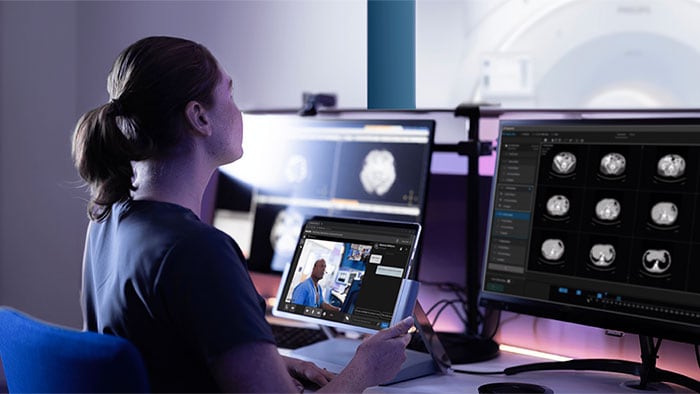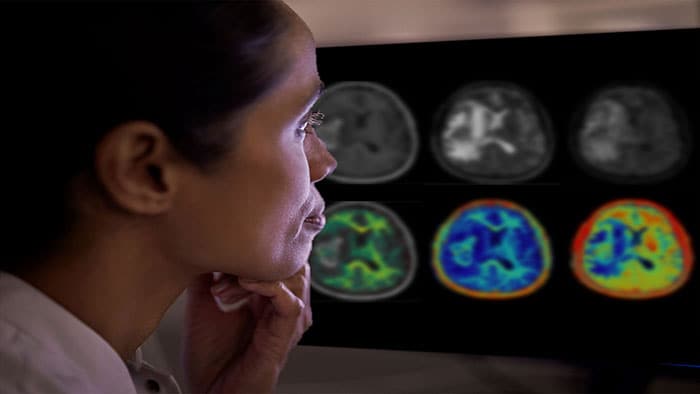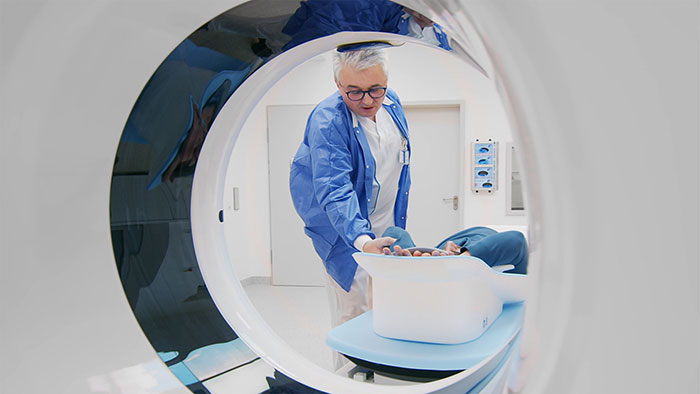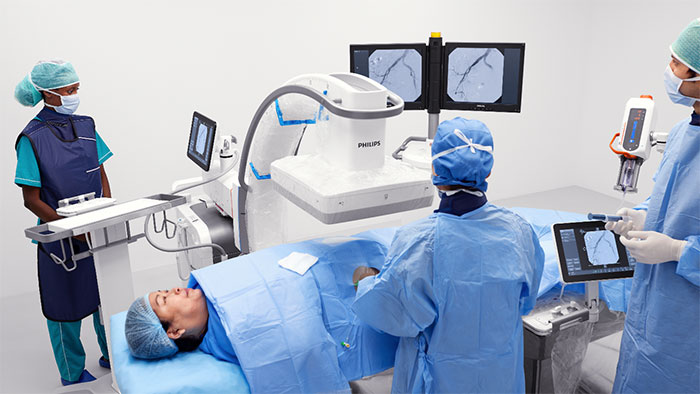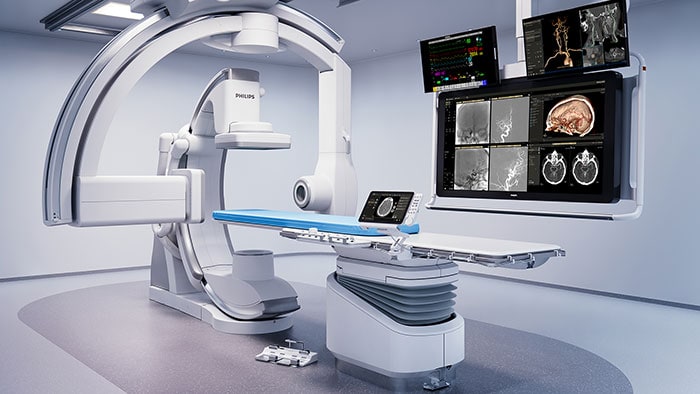Eindhovens Dagblad: Philips verbetert röntgen verder, met AI en 3D
jul 03, 2025 | 2 minuten leestijd
Op de Philips-campus in Best ontving Daniel Mazon, Global Business Unit Leader Diagnostic X-Ray Systems, het Eindhovens Dagblad om te vertellen over innovaties in de röntgentechnologie – zoals het gebruik van AI en 3D-camera’s.
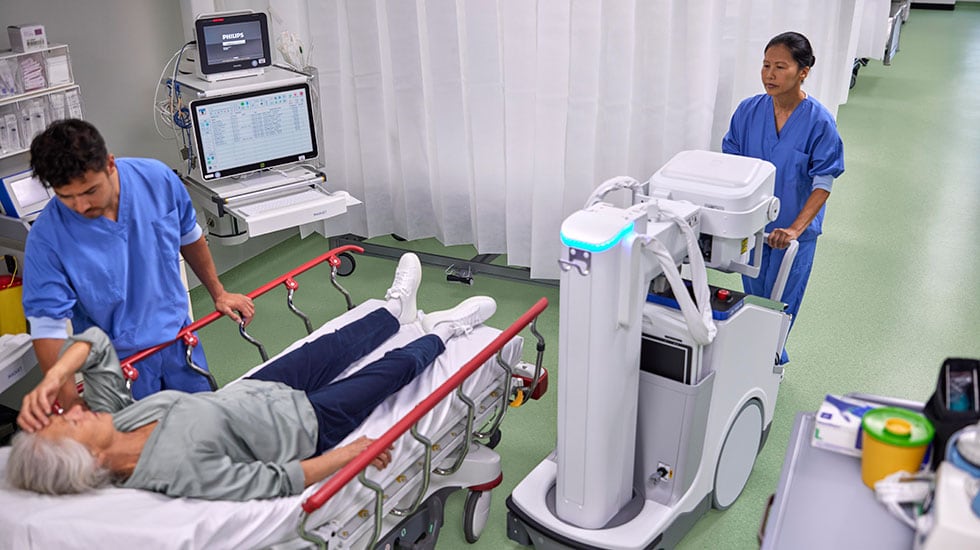
Mobiel röntgenapparaat komt naar de patiënt toe
"Röntgentechniek kun je zien als de voordeur van het ziekenhuis", vertelt Mazon op de Campus van Philips in Best. “Het maken van een foto is de eerste stap bij binnenkomst in een ziekenhuis, bijvoorbeeld na een auto-ongeluk of een val van de fiets, om snel de aard van het letsel vast te stellen."
Een voorbeeld van zo’n innovatie is het mobiele röntgenapparaat, de Radiography 7000 M, dat met subtiele bewegingen ondersteuning biedt zodra je de handgreep aanraakt. Ondanks dat het apparaat zo’n 450 kilo weegt, voelt dat dankzij het ingebouwde hulpsysteem niet zo. Het systeem, ongeveer zo groot als een winkelwagen en kan gemakkelijk naar de patiënt worden gereden – dat is belangrijk wanneer iemand niet in staat is om zelf naar de röntgenkamer te komen.
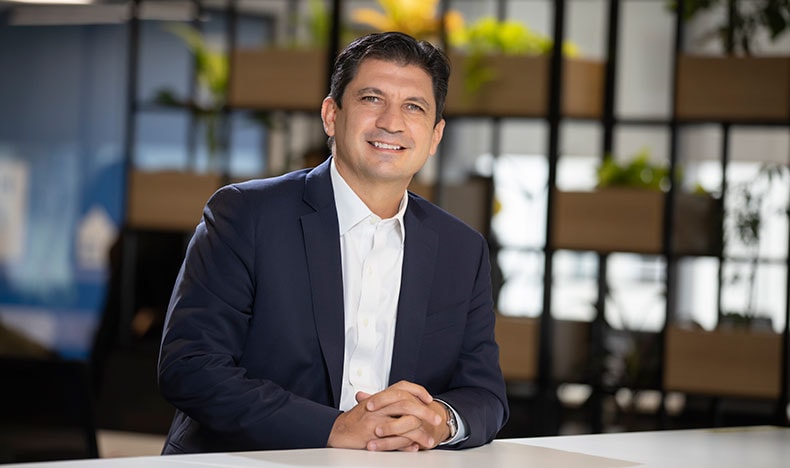
Nieuwe productie, wereldwijd bereik
Enkele jaren geleden werd de productie van röntgensystemen naar Best verplaatst. Nu worden ze vanuit hier wereldwijd verzonden. Er werken zo’n zestig medewerkers van 22 verschillende nationaliteiten – en opvallend: maar liefst 40% van het personeel is vrouw.
Versneld onderzoek, lagere stralingsdosis
Philips' betrokkenheid bij medische technologie begon al tijdens de Eerste Wereldoorlog, toen artsen hulp zochten bij het repareren van röntgenbuizen. Ook vandaag de dag is röntgentechnologie volop in ontwikkeling. De apparaten waaronder de Radiography 7300 C uit Best zijn uitgerust met sensoren en AI, en verwerken beelden in real-time. Ze kunnen automatisch het röntgengebied afbakenen en zichzelf nauwkeurig positioneren op het lichaam van de patiënt. Dit versnelt onderzoeken en maakt het werk van radiologen en laboranten gemakkelijker en efficiënter. Bovendien verlaagt dankzij deze techniek de stralingsdosis, en dat is met name belangrijk voor kinderen, die kwetsbaarder zijn omdat ze nog in de groeifase zitten.
Het Frisius MC (voorheen MCL) nam in augustus vorig jaar als eerste ziekenhuis ter wereld het nieuwe de Radiography 7300 C in gebruik. Dankzij de slimme AI-toepassingen en een 3D-camera helpt het systeem de zorgprofessionals hier om röntgenonderzoeken sneller en preciezer uit te voeren. Zorgverleners hoeven minder handelingen te verrichten en er is zo een lagere kans op herhaalopnames.
Lees hier het volledige artikel bij Eindhovens Dagblad
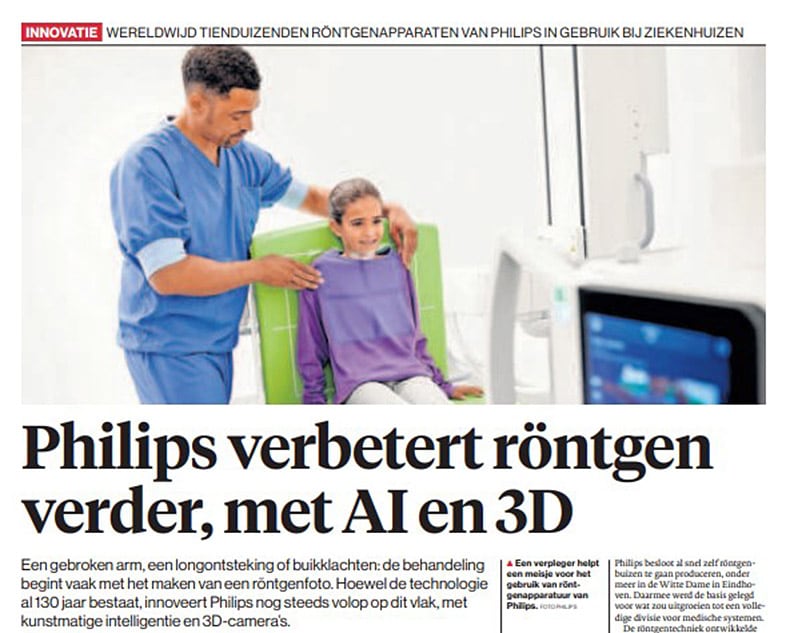
Eindhovens Dagblad: Philips advances X-ray technology with AI and 3D
On the Philips campus in Best, Daniel Mazon, Global Business Unit Leader for Diagnostic X-Ray Systems, welcomed the Eindhovens Dagblad to discuss innovations in X-ray technology, including the use of AI and 3D cameras.

Mobile X-ray machine brought to the patient
"X-ray technology can be considered the front door of the hospital," says Mazon on the Philips Campus in Best. "Taking an image is the first step upon arrival at a hospital, for example, after a car accident or falling off your bike, to quickly determine the nature of the injury."
An example of such an innovation is the mobile X-ray device, the Radiography 7000 M, which offers support with subtle movements as soon as you touch the handle. Although the device weighs about 450 kilos, it doesn't feel that way thanks to the built-in assistance system. The system, about the size of a shopping cart, can easily be wheeled to the patient – which is important when someone is unable to go to the X-ray room themselves.

New facility, global Reach
A few years ago, the production of X-ray systems was moved to Best. Now, the systems are shipped to all over the world from here. Around sixty employees of 22 different nationalities work there, and notably, as many as 40% of the staff are women.
Faster examinations, lower radiation
Philips' involvement in medical technology began during the First World War when doctors sought help repairing X-ray tubes. Even today, X-ray technology is constantly evolving. Devices, including the Radiography 7300 C from Best, are equipped with sensors and AI, processing images in real-time. They can automatically define the X-ray area and position themselves accurately on the patient's body. This speeds up examinations and makes the work of radiologists and lab technicians easier and more efficient. Moreover, this technology reduces the radiation dose, which is particularly important for children, who are more vulnerable because they are still growing.
The Frisius MC (formerly MCL) was the first hospital in the world to start using the new Radiography 7300 C in August of last year. Thanks to smart AI applications and a 3D camera, the system helps healthcare professionals perform X-ray examinations faster and more precisely. Caregivers have fewer actions to perform, and it results in a lower chance of repeat scans.
Read the full article (in Dutch) at Eindhovens Dagblad



